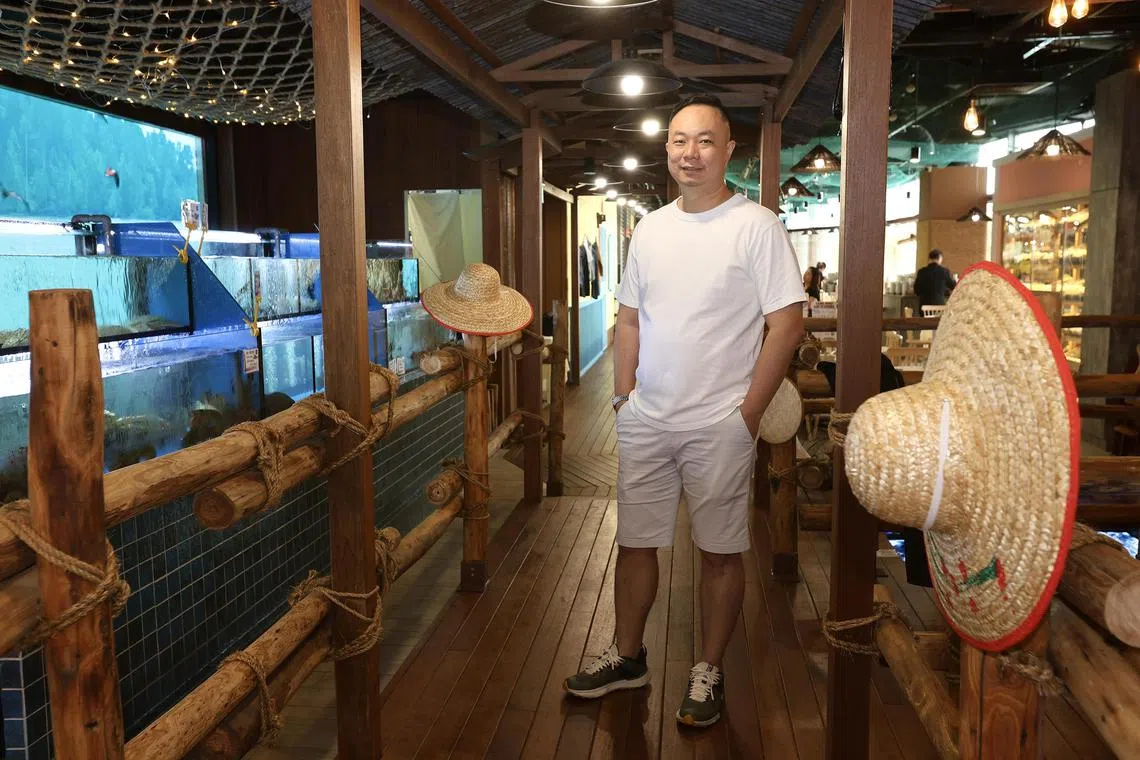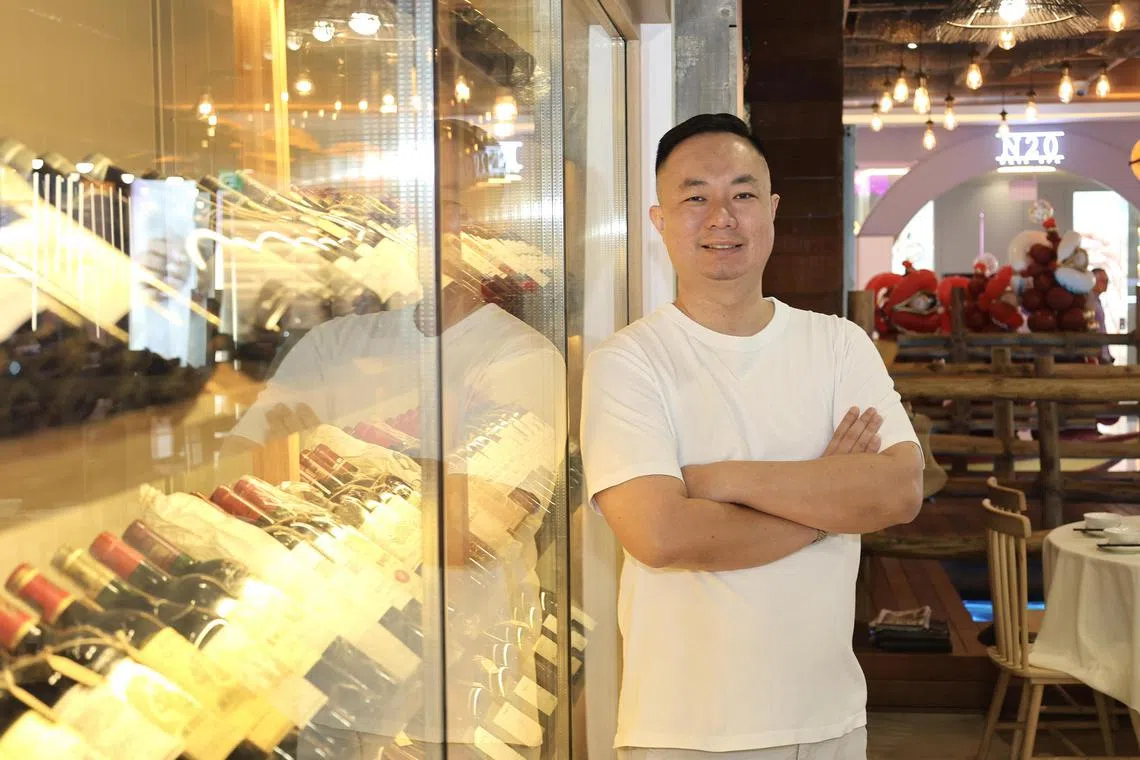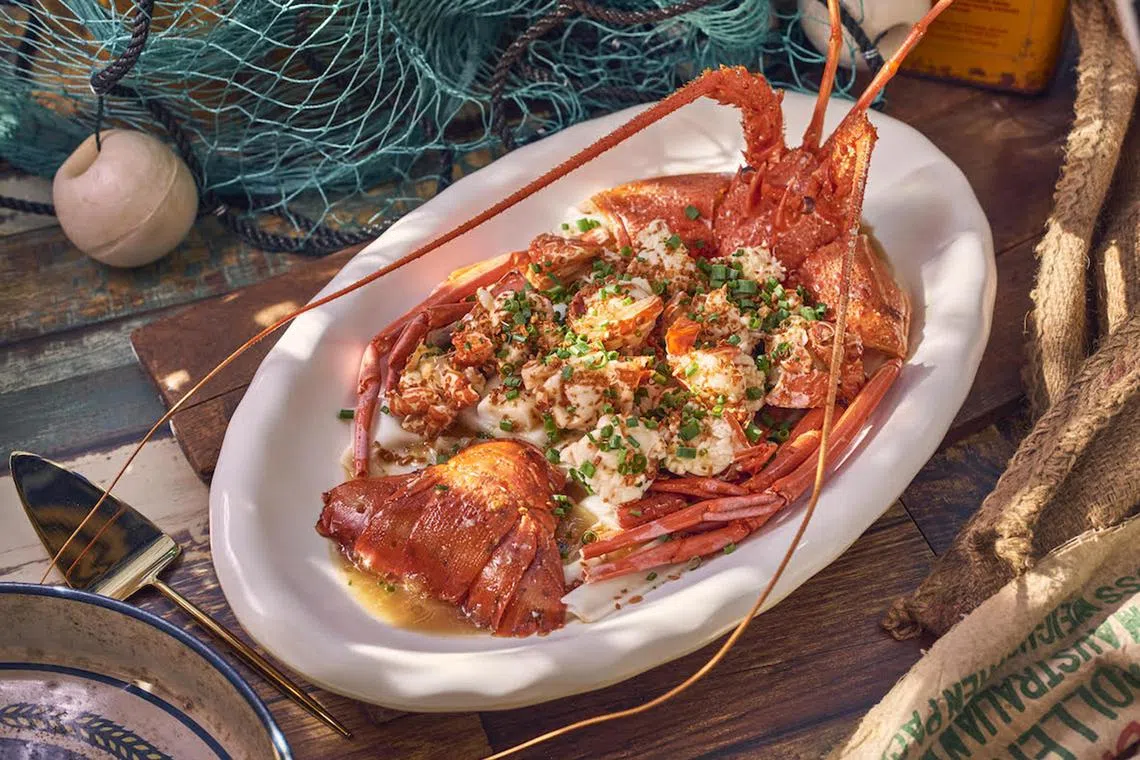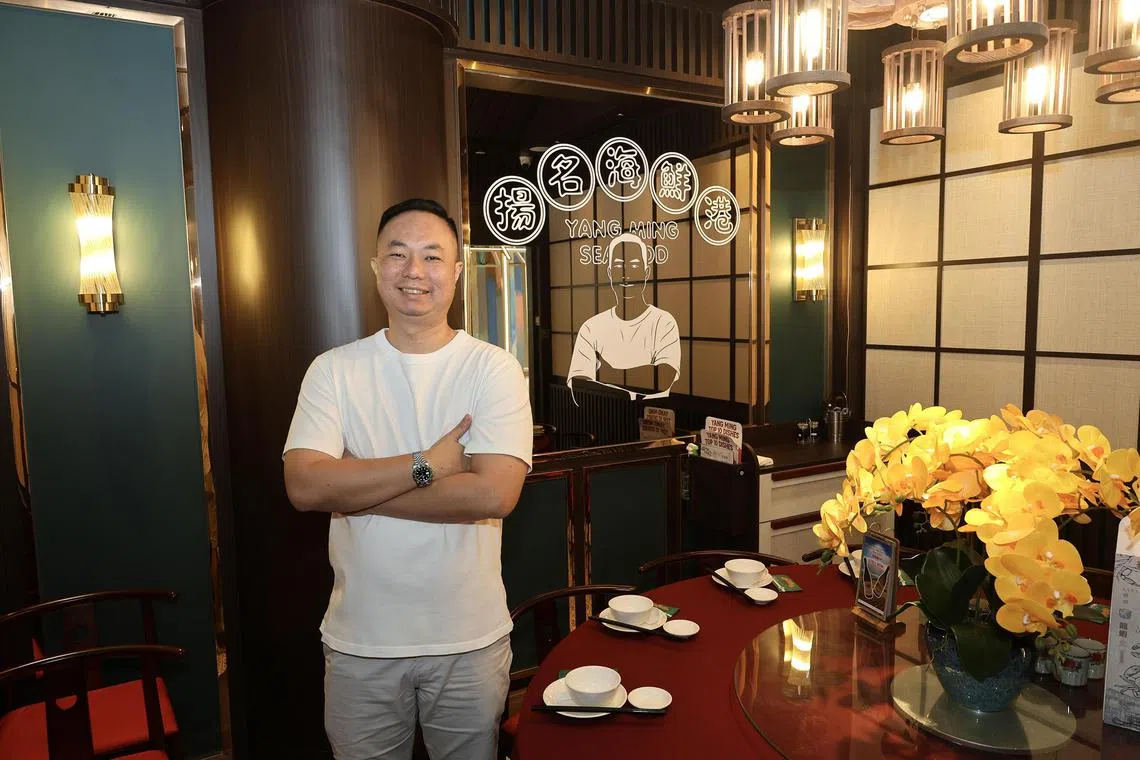Tastemakers: Bouncing back from multiple business failures to become a million-dollar restaurateur
Sign up now: Weekly recommendations for the best eats in town

Mr Keith Kang opened his third and newest outlet of Yang Ming Seafood at VivoCity in September.
ST PHOTO: HEDY KHOO
Follow topic:
SINGAPORE – He lost $100,000 of his savings after five failed economy rice stalls, but Penang-born Keith Kang clawed his way back to become a million-dollar restaurateur.
The 41-year-old founder of popular zi char chain Yang Ming Seafood took his brand beyond coffee shops by opening his first full-fledged restaurant at VivoCity on Sept 26. The 250-seat kelong-themed space is his biggest investment to date, costing over $1m.
His other two seafood outlets are at a Bishan coffee shop and the canteen of an industrial building in Ubi Crescent.
He is also the owner and founder of the retro-themed Great Nanyang Heritage Cafe – with two outlets in Craig Road and Somerset – that went viral for its kopitiam vibes, kaya toast and soft-boiled kampung eggs.
The indefatigable entrepreneur, who runs another coffee shop, four economy rice stalls and three economy beehoon stalls in areas like Bukit Merah and Lorong Lew Lian, pins his fierce desire to succeed on growing up poor.
The youngest of three siblings remembers his family of five barely scraping by on his father’s monthly salary of RM600.
They lived on a durian farm, located in Balik Pulau, south-west of Penang, owned by Mr Kang’s maternal relatives, which his father helped to manage. There was neither running water nor electricity.
When Mr Kang was 13, the durian farm was sold. His sole breadwinner father lost his job. Since he was the youngest and showed the most academic promise, he was sent to study at Hua Lian High School, a private Chinese school in Taiping. His parents moved with his elder siblings to Teluk Intan, a town about two hours away by car.
His parents became hawkers, serving coffee and breakfast from 5am and whipping up zi char dishes in the evenings until 11pm. His elder brother dropped out of school to help out. His elder sister, upon completing secondary school, found an office job to supplement the family’s income.
Now aged 47, she works as a sales manager, while his brother, a chef, died from a heart attack at age 42 five years ago.
As for him, he hunkered down to study, scoring enough As to earn a subsidised place at Taiwan’s National Taipei University in 2002. Classes were taught in Mandarin, which he is more fluent in.
He recounts: “I studied hard because everyone in my family worked very hard to support my studies.”
His family could afford to pay only half of his subsidised tuition fees and he worked part-time to pay the remainder and cover his living expenses.
Among other jobs after school, he cleaned toilets and served tables. The most physically demanding job he took on was hauling heavy goods from a container to a warehouse as a labourer, clocking up to 14 hours daily during his school holidays.
Now married with an eight-year-old son, living in a three-bedroom condominium in north-east Singapore and driving a BMW X6, he recalls: “I came to understand that money is hard to earn. Now when I have it, I treasure it.”

Mr Keith Kang’s other two seafood outlets are at a Bishan coffee shop and the canteen of an industrial building in Ubi Crescent.
ST PHOTO: HEDY KHOO
In 2006, he graduated with a degree in economics and headed to Singapore the following year to work as a purchaser at an electronic components factory. He became a Singapore permanent resident in 2008 and married his childhood sweetheart from Taiping in 2013.
While he beavered away at his first job for nine years, he harboured hopes of striking it out on his own. He ran multiple side hustles, from selling birds’ nest to rearing arowana.
Many of these ventures ended in failure, but he was undeterred and quit his full-time job in 2016 – on the day his only child was born, Feb 29 – to pursue his entrepreneur dreams.
To supplement their household income, his wife, Ms Charlene Lim, 41, who works full time as an account executive in a shipping company, took on freelance accounting jobs.
His first business foray was taking over a bak kut teh stall at a Syed Alwi Road coffee shop for $10,000. His parents, who had sacrificed much for his education, were disappointed with his decision to go into the difficult, labour-intensive world of F&B.
He worked alone, slogging for 16 hours daily, selling both bak kut teh and bak chor mee. But he had to shutter his stall three months later after business failed to pick up.
A group of economy rice stall cooks he had befriended suggested he invest in stalls which they would operate for him. He sunk in $60,000 of his savings to open five stalls within six months in Buangkok, Changi, Ang Mo Kio, Sembawang and Neil Road.
At least one closed within three months when some of the cooks ventured out to start their own stalls and neglected the ones he had invested in. His losses spiralled to $100,000.
He recollects: “There were times I cried quietly to myself. It was the hardest year of my life. I lost my direction. I would wake up in the middle of the night and worry about my finances and future. It was an extremely stressful period.”
To recoup his losses, he retained the stalls in Neil Road and Buangkok, and hired new employees. He recalls: “My wife had to support me financially. I didn’t dare tell my parents about my failed business venture.”
The turning point came in 2017, when a veteran coffee-shop owner invited him to open a coffee shop in Ang Mo Kio together. There, he learnt the ins and outs of running a food business.
In 2018, the owner of the original Yang Ming Seafood food stall at a Bukit Batok coffee shop offered to sell him the business for $60,000. But after he paid up, the owner died of a heart attack during a trip to China before the paperwork was completed.
Despite that hiccup, he eventually took control of the business. He retained its workers and ran the stall until 2021, when he had to close it due to insufficient manpower.
In 2019, he rented the 3,000 sq ft Bishan coffee shop to open a new outlet, hiring new chefs and completely overhauling the menu and concept. He says: “I wanted the new Yang Ming Seafood to be different and stand out from other zi char stalls.”
He poured $100,000 into the new coffee shop, installing tanks for Boston lobsters and fish. Initially, business was sluggish at the 180-seater coffee shop, which saw losses of up to $60,000 in the first six months.
He recalls: “I started to feel the same familiar stress I had faced when my economy rice chain failed.”
But things picked up after he began offering set menus for two to three diners, starting at $29.90 for a curry fish head and two other dishes such as pork ribs and vegetables. He also introduced free corkage for diners who wanted to bring their own wines.
He launched new dishes such as Special Ginger Kampong Chicken, in which the chicken is marinated in sand ginger, steamed, then pan-fried. It costs upwards of $25. There is also Pig’s Stomach Chicken Soup, which comprises a kampung chicken stuffed into a pig stomach and simmered in soup. It costs $78. These dishes have become signatures at his three outlets.
His most Instagrammed dish is the Andrew Lobster, steamed lobster served on a bed of chee cheong fun, costing $148 a kg for the lobster.

Andrew Lobster at Yang Ming Seafood.
PHOTO: YANG MING SEAFOOD
After a year, his Bishan outlet broke even.
In 2021, he opened another branch at a 6,500 sq ft canteen space in Excalibur Centre in Ubi Crescent, which can seat 300, and spent $300,000 on renovations. It broke even after two years.
At his latest restaurant’s swanky new digs at VivoCity, complete with VIP rooms, Mr Kang’s usual work attire is a plain T-shirt, bermudas and comfortable Columbia sneakers. He does not hesitate to take orders and serve customers when it gets busy.

Mr Keith Kang, founder of Yang Ming Seafood, at his third and newest outlet at VivoCity.
ST PHOTO: HEDY KHOO
He says: “My friends and customers ask me why I still dress as if I were at a coffee shop, but I feel comfortable this way. When the restaurant gets busy, the atmosphere is like that of a coffee shop – noisy with people talking loudly.
“This is the type of vibes I want. We are not an atas restaurant, there is no need for etiquette. I want customers to feel relaxed.”
He now hires a total of 150 full-time employees across all his outlets. He has no immediate plans to open more Yang Ming Seafood offshoots, but is working on launching up to eight more outlets of Great Nanyang Heritage Cafe instead. Its third outlet is slated to open at Singapore Science Park in March 2025.
Mr Kang still works non-stop, even on weekends. He visits each outlet at least twice a week, dropping in on at least four outlets daily for meetings. His sole indulgence is savouring and collecting red wine, a hobby he picked up from regular customers.
He says: “I enjoy being a businessman and working for myself. I feel I am just starting out and I still have many things to do, such as thinking of new F&B brands.”
Still, his greatest sense of achievement comes from his parents finally accepting his decision to go it alone. He is proud he managed to help them retire in 2019 in Malaysia.
He says, smiling: “They don’t question my business decisions any more.”
Tastemakers is a new personality profile series on food and beverage vendors who are creating a stir.


